The “Harlem Renaissance” was a period of African American creativity in art, music and literature that flourished in New York City’s Harlem neighborhood during the 1920s and 1930s. One of the leading thinkers and authors of that period was Langston Hughes (1902-1967), a prolific writer of poetry, novels, short stories, plays, children’s stories, essays, and lyrics for operas and musicals. When he died of complications arising from prostate cancer on 22 May 1967 at the age of 65, Hughes left behind a great body of lasting work that still carries influence today.
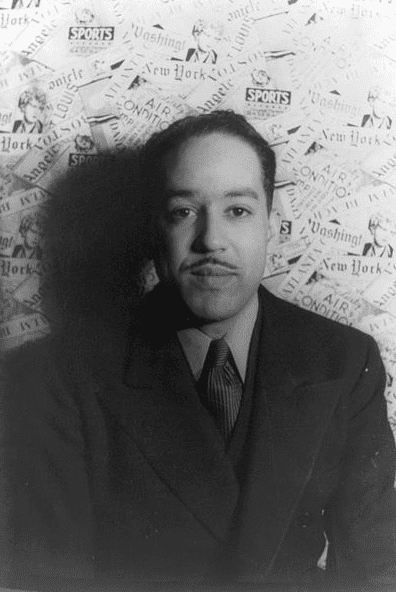
As well as being a gifted writer, James Mercer Langston Hughes was a social activist who worked hard to instill racial pride in the African American community. Although his lineage was mixed (he also came from Native American and white ancestors – including American, English, French, Scottish, and Jewish), it was his identity as a Black man that Hughes concentrated on and celebrated.
His writing centered on the real-life concerns and joys of poor and working class African Americans, helping to promote the pride and strength captured by the saying “Black is beautiful.” In 1926, the weekly magazine The Nation published Hughes’s essay “The Negro Artist and the Racial Mountain” that powerfully articulated this vision, including these lines:
“The younger Negro artists who create now intend to express our individual dark-skinned selves without fear or shame. If white people are pleased we are glad. If they are not, it doesn’t matter. We know we are beautiful. And ugly, too.”
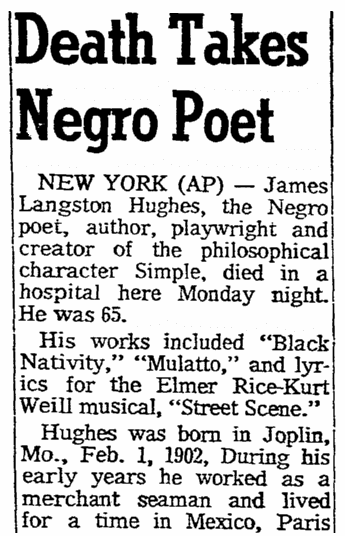
Here is a transcription of this article:
Death Takes Negro Poet
NEW YORK (AP) – James Langston Hughes, the Negro poet, author, playwright and creator of the philosophical character Simple, died in a hospital here Monday night. He was 65.
His works included “Black Nativity,” “Mulatto,” and lyrics for the Elmer Rice-Kurt Weill musical, “Street Scene.”
Hughes was born in Joplin, Mo., Feb. 1, 1902. During his early years he worked as a merchant seaman and lived for a time in Mexico, Paris and Italy.
He gained recognition as a writer when he took first prize in a poetry contest for Negro writers sponsored by Opportunity magazine in 1925.
Simple – his full name was James B. Simple – was a Harlem philosopher with a Negro point of view. Through Simple’s voice Hughes commented on race relations and current events.
“I am telling you,” said Simple in one essay, “life is liable to kill us before death does.”
The fame of Simple spread when Hughes became a syndicated columnist for the Chicago Defender, a Negro weekly since turned daily.
Note: Langston Hughes spent about five of his formative years in Cleveland, where he attended high school. As a consequence, the Cleveland area took a keen interest in his death, as reflected in these two newspaper articles. The first is a news report of his death, and the second is an editorial.
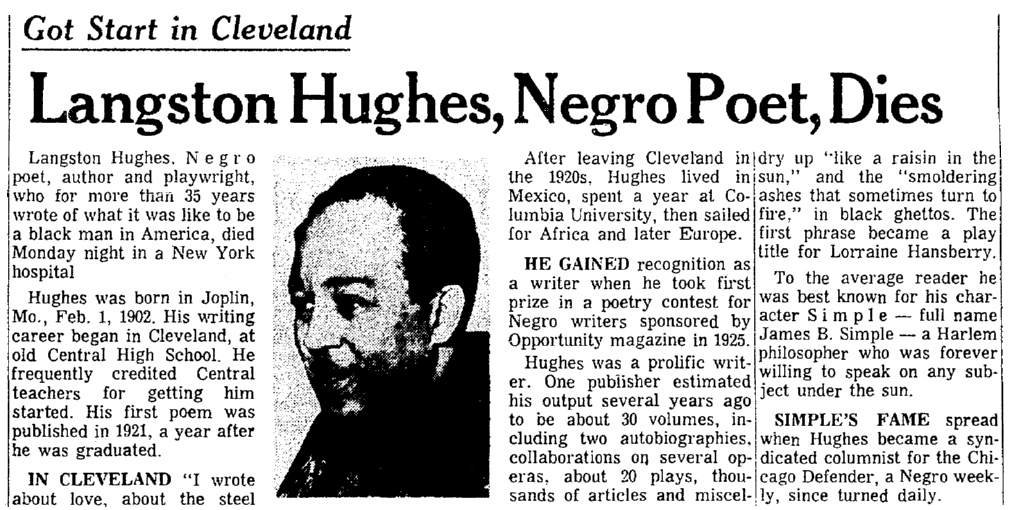
Here is a transcription of this article:
Got Start in Cleveland
Langston Hughes, Negro Poet, Dies
Langston Hughes, Negro poet, author and playwright, who for more than 35 years wrote of what it was like to be a black man in America, died Monday night in a New York hospital.
Hughes was born in Joplin, Mo., Feb. 1, 1902. His writing career began in Cleveland, at old Central High School. He frequently credited Central teachers for getting him started. His first poem was published in 1921, a year after he was graduated.
In Cleveland “I wrote about love, about the steel mills where my father worked, the slums where we lived, and the brown girls from the South, prancing up and down Central Avenue on a spring day,” he once said.
Hughes lived near and worked at the Karamu House. His plays have frequently been performed there. The playwright was here last year to help Karamu celebrate its 50th anniversary.
After leaving Cleveland in the 1920s, Hughes lived in Mexico, spent a year at Columbia University, then sailed for Africa and later Europe.
He gained recognition as a writer when he took first prize in a poetry contest for Negro writers sponsored by Opportunity magazine in 1925.
Hughes was a prolific writer. One publisher estimated his output several years ago to be about 30 volumes, including two autobiographies, collaborations on several operas, about 20 plays, thousands of articles and miscellaneous poems.
His works included “Black Nativity,” “Mulatto,” and lyrics for the Elmer Rice-Kurt Weill musical, “Street Scene.”
He wrote eloquently about a black dream that can dry up “like a raisin in the sun,” and “the smoldering ashes that sometimes turn to fire,” in black ghettos. The first phrase became a play title for Lorraine Hansberry.
To the average reader he was best known for his character Simple–full name James B. Simple – a Harlem philosopher who was forever willing to speak on any subject under the sun.
Simple’s fame spread when Hughes became a syndicated columnist for the Chicago Defender, a Negro weekly, since turned daily.
After roaming the world, Hughes settled in Harlem, a place he loved. “I’ll never leave Harlem for anywhere else,” he once said.
Hughes entered the hospital two weeks ago and had undergone surgery Friday.
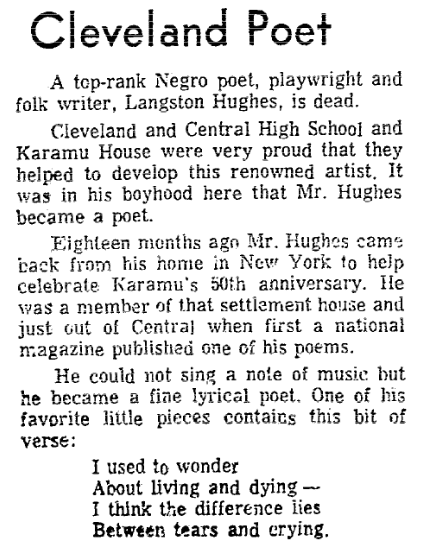
Here is a transcription of this article:
Cleveland Poet
A top-rank Negro poet, playwright and folk writer, Langston Hughes, is dead.
Cleveland and Central High School and Karamu House were very proud that they helped to develop this renowned artist. It was in his boyhood here that Mr. Hughes became a poet.
Eighteen months ago Mr. Hughes came back from his home in New York to help celebrate Karamu’s 50th anniversary. He was a member of that settlement house and just out of Central when first a national magazine published one of his poems.
He could not sing a note of music but he became a fine lyrical poet. One of his favorite little pieces contains this bit of verse:
I used to wonder
About living and dying—
I think the difference lies
Between tears and crying.
Note: Two months after he died, the last collection of his poems that Hughes worked on during his lifetime was published: The Panther and the Lash. This book review was published on 16 July 1967.
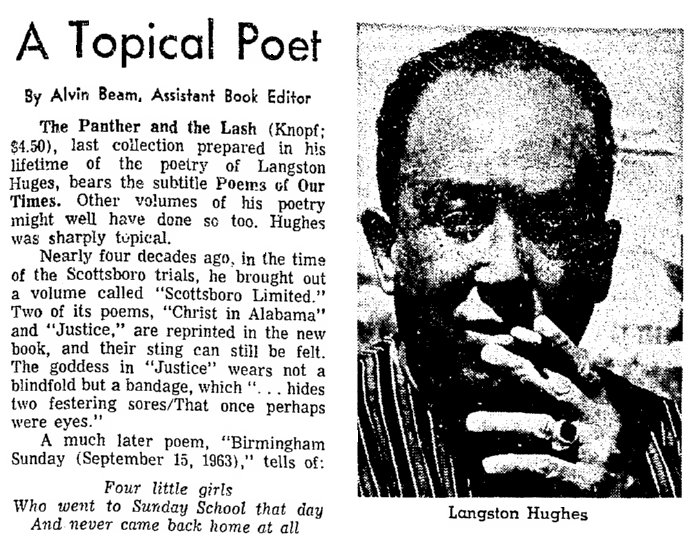
Here is a transcription of this article:
A Topical Poet
By Alvin Beam, Assistant Book Editor
The Panther and the Lash (Knopf; $4.50), last collection prepared in his lifetime of the poetry of Langston Hughes, bears the subtitle Poems of Our Times. Other volumes of his poetry might well have done so too. Hughes was sharply topical.
Nearly four decades ago, in the time of the Scottsboro trials, he brought out a volume called “Scottsboro Limited.” Two of its poems, “Christ in Alabama” and “Justice,” are reprinted in the new book, and their sting can still be felt. The goddess in “Justice” wears not a blindfold but a bandage, which “…hides two festering sores/That once perhaps were eyes.”
A much later poem, “Birmingham Sunday (September 15, 1963),” tells of:
Four little girls
Who went to Sunday School that day
And never came back home at all
But left instead
Their blood upon the wall
With spattered flesh
And bloodied Sunday dresses…
Hughes, a Clevelander for five or six years in his youth, liked to emphasize that he was not just a poet but a Negro poet, and there was often an ironical wit in his handling of contemporary race situations:
I love Ralph Bunche –
But I can’t eat him for lunch.
He could poke sly fun at the “white liberal”:
The lobster is delicious,
The wine divine,
And center of attention
At the damask table, mine.
To be a problem on
Park Avenue at eight
Is not so bad.
Solutions to the Problem,
Of course, wait.
Hughes was 65 when he died in New York two months ago. His first published poem, “The Negro Speaks of Rivers,” appeared in The Crisis in 1921, the summer after his graduation from old Central High School here.
Altogether he had published nine volumes of poetry and nearly 30 other books when death came. Two of his plays, “Mulatto” and “Simply Heavenly” have been produced on Broadway. These and his song-play, “Black Nativity,” have frequently been done at Karamu House here. He wrote the lyrics for the Elmer Rice-Kurt Weill musical, “Street Scene.”
Hughes’ work, including much of it that dealt with things of the immediate moment, is likely to endure for some time, and very likely a single thick volume of the best of it will be out some year soon.
A dozen or so of the 44 new poems in The Panther and the Lash should make that later volume. The present book is being published simultaneously in an attractive paperback edition at $1.95.
